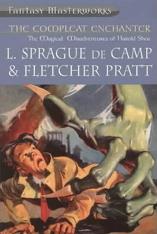
The Compleat Enchanter
L. Sprague de Camp
Fletcher Pratt
420 pages
published in 1975
J. R. R. Tolkien has such a hold on the fantasy genre still, both through writers following in his footsteps and through those consciously rebelling against his influence that it’s sometimes hard to remember that there was a fantasy genre before Lord of the Rings. There have always been fantasy writers, from the largely anonymous creators of myths, legends and fairy tales up to serious Victorian writers like Charles Kingsley and Christina Rossetti. And when science fiction was born from the American pulps of the 1920ties, fantasy was right there with it. In fact pulps like Weird Tales, devoted to weird or fantastic stories had existed long before the first dedicated science fiction magazine appeared.
Science fiction and fantasy then were even more intertwined than they are today, especially in the subgenre of socalled rationalised fantasy written by the writers working for John Campbell. As you know if you’re a proper science fiction fan, John Campbell was the editor who’s largely credited for lifting science fiction out from its pulp roots and he attempted to do the same for fantasy through the near-legendary magazine Unknown. The way Cambell and his writers approached fantasy was the same as how they dealt with science fiction, by giving fantasy an internal consistency, coherence and rationale, much less mood based than a lot of older fantasy. In Unknown‘s brand of fantasy there are rules to be discovered and experimented with. The Compleat Enchanter is one of the best known examples of this genre, with L. Sprague de Camp and Fletcher Pratt having been regular contributors to Unknown for which they wrote the three stories that make up this book.